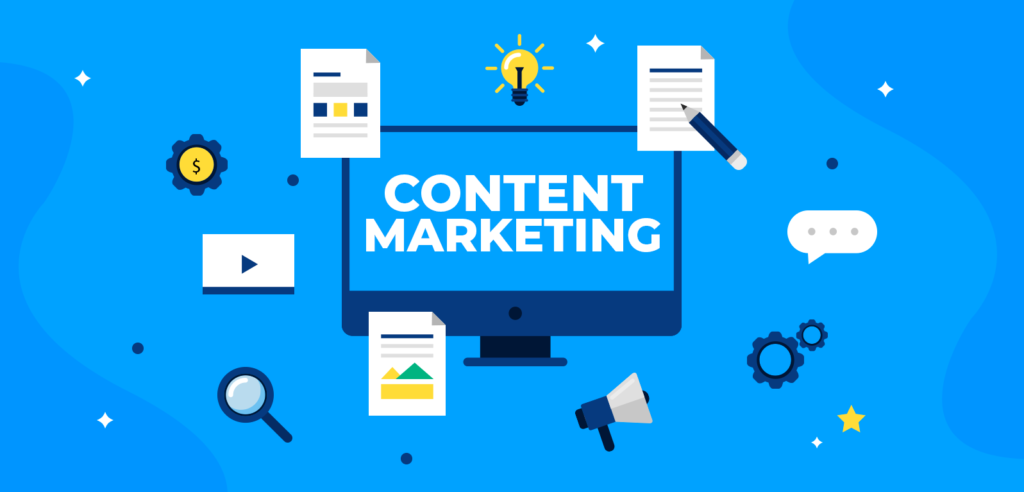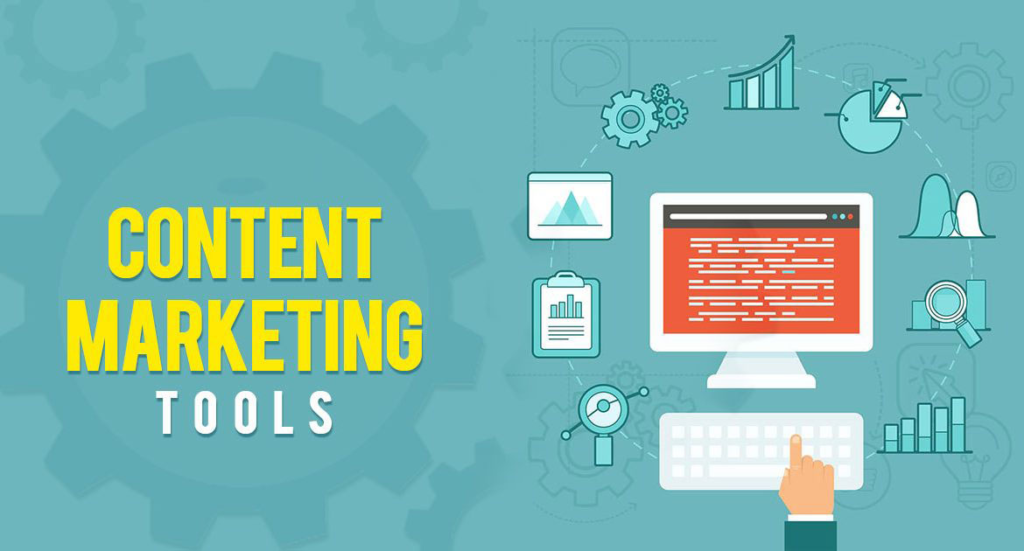Content marketing has evolved greatly and considerably matters in today’s day and age.
In the digital world, content marketing is equal to search engine optimization and social branding.
One without the other is depicted, so it’s important to produce, optimize, and manage content in a legit way.
In this guide, I’ll guide you about everything you need to know about Content Marketing.
By the end of the blog, you will learn how to create a successful content marketing strategy, you can unlock the key to reaching your audience and driving more conversions.
With the right approach, you can develop a content marketing plan that resonates with your target market, communicates your brand’s message effectively, and establishes your business as a thought leader in your industry.
So why not take the time to explore the ins and outs of content marketing and learn how to make it work for you?
Table of Contents
Content marketing guide: Overview

- What is content marketing?
- Why is content marketing important?
- Types of content marketing
- How does content marketing benefit companies?
- Best content marketing tools to try
- How to integrate content marketing and SEO?
- Final verdict: Content marketing pros and cons
Also read: 10 Proven E-commerce Marketing Strategies To Skyrocket Your Sales
What Is Content Marketing?

Content marketing is a marketing strategy that involves creating and sharing valuable, relevant, and consistent content to attract and retain a specific audience, ultimately driving profitable customer action.
The goal of content marketing is to provide useful and informative content that engages and informs potential customers, rather than solely promoting a product or service. The content can take many forms, including blog posts, videos, infographics, podcasts, whitepapers, social media posts, and more.
Why Is Content Marketing Important?

Content marketing is important for several reasons:
- Builds brand awareness: Content marketing can help you establish your brand as a thought leader in your industry, and can help you reach new audiences by creating content that resonates with them.
- Drives website traffic: Creating high-quality content that is optimized for search engines can help increase your website’s visibility and drive more traffic to your site.
- Generates leads: By creating valuable content that addresses your audience’s pain points, you can attract potential customers and generate leads for your business.
- Builds trust and credibility: When you consistently create helpful and informative content, you establish trust with your audience and position yourself as a credible source of information.
- Helps with customer retention: By continuing to provide valuable content to your existing customers, you can keep them engaged and increase their loyalty to your brand.
Overall, content marketing is an effective way to attract and retain customers, establish your brand as a thought leader, and ultimately drive revenue for your business.
Also, read 7 Secrets About Instagram Marketing That No One Will Tell You!
Types Of Content Marketing

In content marketing, not all types of content will reap the same level of rewards. Thus, content marketers don’t rely on similar content marketing strategies to procure end results.
Here are some of the best types of content marketing:
1. Blogs
Hey there! If you’re looking for a way to keep your website fresh and interesting, have you considered starting a blog? Not only are they super versatile and easy on the wallet, but they’re also great for driving traffic to your site.
With a blog, you can really dive into the topics that matter most to your audience, using long-form content to showcase your expertise and highlight the keywords that matter most for SEO.
So why not give it a try? You might be surprised at how effective a well-crafted blog can be for your website’s success!
2. Case Studies
Case studies are a powerful tool that can help your audience understand the benefits of your product or service.
By presenting real-life scenarios, case studies offer a relatable and engaging way for potential customers to see how others like them have used your offering to solve their problems.
This helps them envision their own buying journey and how your product or service could work for them. In addition, case studies can also help establish your brand as a thought leader in your industry and build trust with your target audience.
So, if you’re looking for an effective way to showcase the value of your offering, consider creating a compelling case study that speaks directly to your customers’ needs and pain points.
3. Guides And How-Tos
Comprehensive guides and instructional materials are essential for any company that provides a complicated product or service.
Moreover, they serve as an effective means to showcase your expertise and widen your digital footprint.
You can share with your audience about niche guides or specific-focused how-to examples that solve their questions or situations.
4. Interviews/Q&As
If you’re looking to amplify your audience reach with just one content piece, then an interview on Joe Rogan’s podcast is a great way to do it.
Although it might not be an easy feat, there are other ways to leverage the power of interviews and question-and-answer segments to promote your brand and get noticed by potential customers.
Don’t be disheartened by the challenges – with a strategic approach and a solid plan, you can reap the rewards of this highly effective marketing tactic.
5. Podcasts
Podcasting provides an effective avenue for you to connect with your audience by sharing your personal experiences and stories, thus creating lasting relationships.
To make the most of your podcasts, it is essential to deliver valuable content that is both informative and entertaining. Additionally, utilizing guest hosts or interviewees presents an opportunity for you to broaden your reach and expand your listener base.
Also, read: SaaS SEO: How To Create An Effective SEO Strategy For SaaS Business
How Content Marketing Benefits Companies?

Increased brand awareness: Content marketing can help companies reach new audiences and increase their brand visibility by creating content that resonates with potential customers.
Improved search engine rankings: Creating high-quality, optimized content can help companies rank higher in search engine results pages (SERPs), making it easier for potential customers to find them online.
Generation of leads and conversions: By creating content that addresses the pain points of their target audience, companies can attract potential customers and generate leads, which can then be nurtured into conversions.
Increased customer engagement: Content marketing can help companies build relationships with their customers by providing them with valuable information and insights that they find helpful.
Establishing thought leadership: By creating content that demonstrates their expertise in their industry, companies can position themselves as thought leaders and increase their credibility with potential customers.
Improved customer retention: By continuing to provide valuable content to their existing customers, companies can keep them engaged and increase their loyalty to their brand.
Overall, content marketing can help companies achieve a variety of business goals, from attracting new customers to retaining existing ones, and can ultimately drive revenue and growth for the business.
Also, read: 7 New (Unheard & Upcoming) Digital Marketing Trends In 2023
Best Content Marketing Tools To Try

There are many content marketing tools available to help businesses create, manage, and distribute their content. Here are some of the best tools for different aspects of content marketing:
1. Content creation
- Grammarly: A tool that checks grammar, spelling, and punctuation in your content.
- Canva: A tool for creating high-quality graphics and images for your content.
- BuzzSumo: A tool for finding popular content and ideas to inspire your own content creation.
2. Content management
- CoSchedule: A tool for managing your content calendar and scheduling social media posts.
- Trello: A project management tool that can be used to organize your content creation process.
- Google Drive: A cloud-based storage solution for your content, allowing for easy collaboration and sharing.
3. Content distribution
- Hootsuite: A social media management tool for scheduling and publishing social media posts.
- Mailchimp: An email marketing tool for creating and sending email newsletters to your subscribers.
- Outbrain: A tool for promoting your content on other websites and platforms.
These are just a few examples of the many content marketing tools available. The best tools for your business will depend on your specific needs and goals, as well as your budget and level of expertise.
Also Read: How to Optimize Your Website for Mobile Devices?
How To Integrate Content Marketing & SEO

Integrating content marketing and SEO is essential for maximizing the impact of both strategies. Here are some steps to follow for integrating content marketing and SEO:
- Conduct keyword research: Use tools like Google Keyword Planner or SEMrush to find keywords and topics that are relevant to your business and have a high search volume.
- Create high-quality content: Develop high-quality content that addresses your target audience’s pain points and interests, while incorporating your target keywords naturally.
- Optimize your content: Optimize your content for search engines by including your target keywords in the title, meta description, headers, and throughout the content. Ensure that your content is structured in a way that is easy to read and understand.
- Build backlinks: Acquire high-quality backlinks from reputable websites by reaching out to relevant publications and websites, and asking them to link to your content.
- Monitor and analyze performance: Use tools like Google Analytics and Google Search Console to monitor the performance of your content and SEO efforts. Analyze data like traffic, engagement, and rankings to determine which content is resonating with your audience and adjust your strategy accordingly.
- Continuously optimize: Continuously optimize your content and SEO strategy based on your analysis, in order to improve your results over time.
By integrating content marketing and SEO, you can create high-quality content that resonates with your target audience and is optimized for search engines, resulting in increased traffic, engagement, and conversions for your business.
Final Verdict: Content Marketing Pros and Cons
Well, that’s all in this blog. Content marketing is an evolving field and thus tactics change as per requirements.
Content marketing has its downfall but that’s okay compared to the results. Before ending this blog, here are brief pros and cons of content marketing.
Pros: build brand awareness, improves SEO, generate leads and conversions, establish thought leadership, and build customer loyalty.
Cons: time-consuming, requires a long-term commitment, and difficult to measure ROI.





